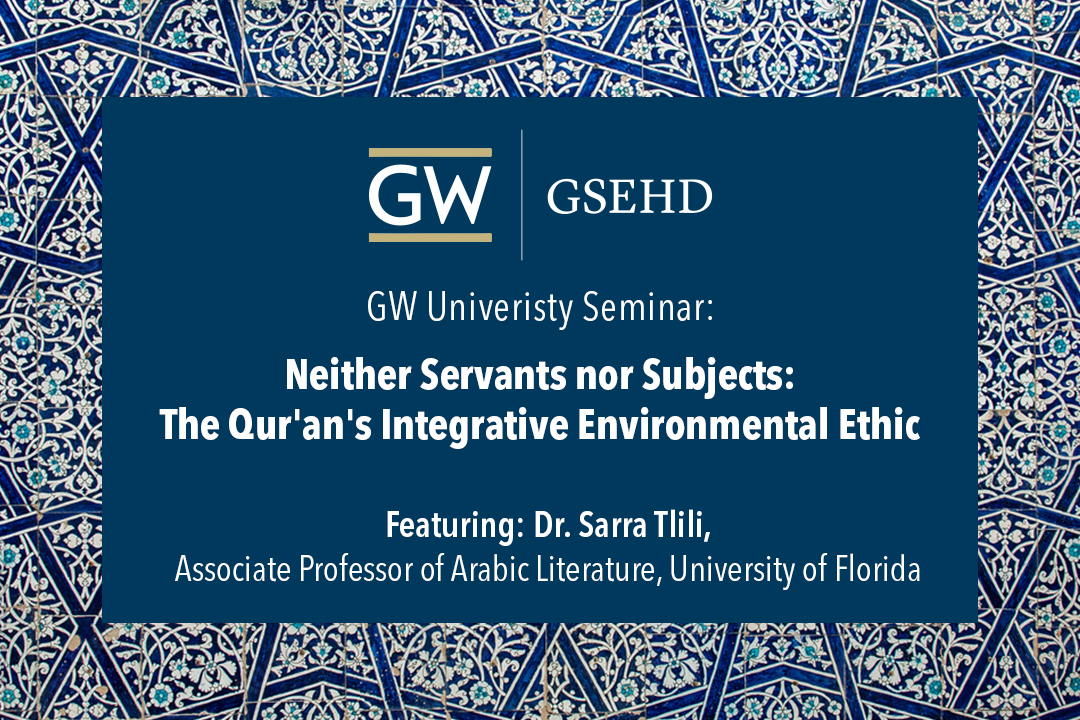
Neither Servants nor Subjects: The Qur'an's Integrative Environmental Ethic
Monday, December 5, 2022
6:00 pm - 8:00 pm

Featuring:
Dr. Sarra Tlili, Associate Professor of Arabic Literature, University of Florida
Moderated by:
Dr. Arshad I. Ali, GW Associate Professor of Educational Research
and
Dr. Ebtissam Oraby, GW Teaching Assistant Professor of Arabic and GSEHD Alumna (Ed.D., Curriculum and Instruction)
Two environmental ethics are typically associated with the Qur’an: dominion and stewardship. Proponents of the dominion position tend to treat this theme casually, as if it is a self-evident fact, yet one also notes this group’s disagreement about this supposed dominion’s scriptural foundation. This is hardly surprising given that no verse in the Qur’an gives humans dominion over other creatures. Proponents of the stewardship position, on the other hand, rely mainly on the Qur’anic notion of “khalīfa,” which they translate as “vicegerent” or “steward,” barely realizing that this is an anachronistic reading of this term. Contrary to these two positions, in this presentation Dr. Sarra Tlili will argue that the Qur’an seeks to integrate humanity in the rest of creation.
After a brief discussion of the dominion and stewardship ethics, Dr. Tlili will cite and analyze several passages to illustrate the various ways in which the Qur’an places humanity within, rather than atop, the created realm.
Featured Speaker: Dr. Sarra Tlili
Dr. Sarra Tlili is Associate Professor of Arabic Literature at the University of Florida. She obtained her PhD from the University of Pennsylvania, Department of Near Eastern Languages and Cultures. Her main research interests include animal and environmental ethics in Islam and the stylistics of the Qur’an. Among her publications are Animals in the Qur’an (Cambridge University Press, 2012), “The Canine Companion of the Cave: The Place of the Dog in Qur’anic Taxonomy,” (JIMS, 2018) and “Fa’ṣdaʿ bi-mā Tuʾmar: A Motif-Based Study of Sūrat al-Ḥijr” (JIQSA, 2019).
GW University Seminar: “And the Earth was Laid Out for All Living Beings” - Muslim Epistemologies, Science, and Non-western Ways of Knowing
This series of conversations, hosted by Dr. Arshad I. Ali and Dr. Ebtissam Oraby, explores the intersection of education, science, and Muslim epistemologies. We aim to expand our understanding of who knowers can be and what ways of knowing are valued. We aim to understand what science means across diverse non-western knowledge systems. For education to engage all young people, we must cultivate learning in a polyverse of scientific epistemologies and not simply rely upon Westernized conceptions of knowledge. By expanding notions of science and scientific epistemology, not only can more diverse individuals pursue scientific knowledge, but we can cultivate opportunities for more diverse questions to address our current ecological crisis, for example.

